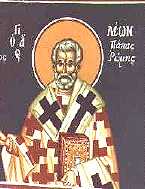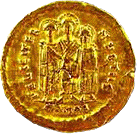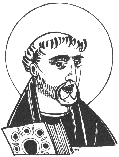October 8: The Two-faced Jesus
The Council of Chalcedon (451)
and the Split Personality of Jesus
It was on this date, October 8, 451, that the fourth of the first seven Ecumenical Councils in Christianity, the Council of Chalcedon opened. Convoked by Byzantine Emperor Marcian, at the urging of Pope Leo I, over 24 days of sessions the 500 bishops and 130 bishop's representatives cranked out 28 canons or statements of infallible church doctrine. Among these decisions were a strong condemnation of Eutychian monophysitism coupled with a strong approval of the doctrine of the dual – divine and human – nature of Jesus, set forth in what came to be known as the Chalcedonian Creed.
The heresy called "Eutychian monophysitism" was the creed of a Byzantine monk named Eutyches (c.380—c.456), who had been teaching that Jesus was all God and not a man. Therefore, the "monophysitism" part meant Jesus had one nature, a divine one, and not a dual nature, divine and human. Now, if you've ever dabbled in critical thinking, you might be amused to reflect, as Robert Ingersoll did, that it took so many centuries for the one true religion to work out the nature of Jesus and God.
Here is how Ingersoll put it in an 1881 lecture called "Great Infidels":
Theodosius called a council at Constantinople in 381, and this council decided that the Holy Ghost proceeded from the Father. Theodosius, the younger, assembled another council at Ephesus to ascertain who the Virgin Mary really was, and it was solemnly decided in the year 431 that she was the Mother of God. In 451 it was decided by a council held at Chalcedon, called together by the Emperor Marcian, that Christ had two natures – the human and divine. In 680, in another general council, held at Constantinople, convened by order of Pognatius, it was also decided that Christ had two wills, and in the year 1274 it was decided at the Council of Lyons, that the Holy Ghost proceeded not only from the Father, but from the Son as well. Had it not been for these councils, we might have been without a Trinity even unto this day. When we take into consideration the fact that a belief in the Trinity is absolutely essential to salvation, how unfortunate it was for the world that this doctrine was not established until the year 1274. Think of the millions that dropped into hell while these questions were being discussed![1]
And Christians won't suffer any disagreement, either. In 380, the Christian Roman Emperor, Theodosius, passed a decree that said:
We shall believe in the single Deity of the Father, the Son, and the Holy Spirit, under the concept of equal majesty and of the Holy Trinity. We command that those persons who follow this rule shall embrace the name of Catholic Christians. The rest, however, whom We adjudge demented and insane, shall sustain the infamy of heretical dogmas, their meeting places shall not receive the name of churches, and they shall be smitten first by divine vengeance and secondly by the retribution of Our own initiative, which We shall assume in accordance with the divine judgment.[2]
But if God was in charge during the Council of Chalcedon, he wasn't above politics. In the fifth century the eastern and western Roman Catholic churches were still working out the issue of papal supremacy: it wasn't yet established that the Roman pope was superior to the Greek pope. So in the fifteenth session of the Council, the Greek Bishops revived a canon (28) declaring papal equality.[3] Instead, the Council drafted, in Pope Leo's name, a version of the proceedings in which the Greek bishops call Leo "head of the universal Church"![4]
Thanks to the actions of the Council of Chalcedon in 451, priests have had to explain to their parishioners the split personality of Jesus with ever-more-desperate appeals to faith and mystery: being both god and man is certainly not defensible biologically – or logically!
[1] Robert Green Ingersoll (1833-1899), "Great Infidels," 1881. You can read the full text at this link.
[2] Quoted from Edward T. Babinski, The Uniqueness of the Christian Experience. 1999, at this link. Babinski goes on to point out: "In the fourth and fifth-centuries citywide riots broke out between Christians with differing theological views and probably more Christians killed Christians at that time than the pagans had done during the previous centuries."
[3] Canon 28 reads, in part: "...we do also enact and decree the same things concerning the privileges of the most holy Church of Constantinople, which is New Rome. For the Fathers rightly granted privileges to the throne of old Rome, because it was the royal city. And the one hundred fifty most religious Bishops gave equal privileges to the most holy throne of New Rome, justly judging that the city is honored with the Sovereignty and the Senate and enjoys equal privileges with the old imperial Rome...."
[4] Ep. 98: "You have often extended your Apostolic radiance even to the Church of Constantinople. ... Knowing that every success of the children rebounds to the parents, we therefore beg you to honor our decision by your assent, and as we have yielded agreement to the Head in noble things, so may the Head also fulfill what is fitting for the children." —Chalcedon to Pope Leo.
One apologist site says Canon 28 was struck by Leo in a "line item veto" style, but that would simply make Leo a power-grabbing politician, rather than a Vicar of Christ: his unilateral action could not have had the acquiescence of the pope of Constantinople.
Originally published October 2003 by Ronald Bruce Meyer.




